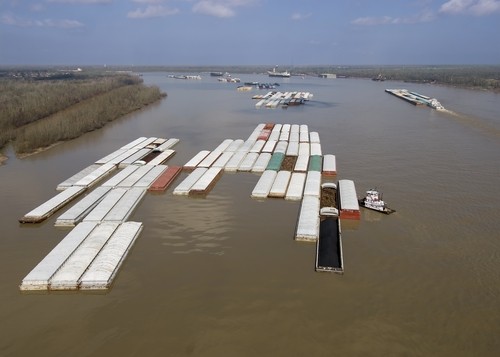Iranian Ship Linked to Houthi Attacks Heads Home Amid Tensions
(Bloomberg) — An Iranian ship that’s been linked to Houthi attacks in the Red Sea is returning home, removing a prominent asset in the area as the Islamic Republic braces...


By Dan Murtaugh
(Bloomberg) — Marathon Petroleum Corp. is unable to load oil from a barge dock on the Mississippi River at Wood River, Illinois, which may depress Canadian oil prices if repairs are lengthy.
The unloading arm at the dock was damaged early today when a barge it was filling with crude was struck by other vessels in the river that became unmoored, Shane Pochard, a Findlay, Ohio- based spokesman for the company, said in a phone interview. Repairs will begin soon.
The dock probably loads 40,000 barrels of heavy Canadian crude a day onto barges that travel down the Mississippi River to Marathon’s 460,000-barrel-a-day Garyville refinery in Louisiana, said Andy Lipow, president of Lipow Oil Associates LLC in Houston. Pochard declined to comment on dock rates.
“A lengthy outage would impact Canadian heavy prices,” Lipow said. “It depends on how much storage Marathon has on site and when their batches are coming in.”
At about 12:30 a.m., about 20 barges became unmoored when they were struck by a tow moving south on the river, said Lieutenant Colin Fogarty, a St. Louis-based public affairs officer for the U.S. Coast Guard.
One of those barges collided with a Kirby Corp.-owned vessel that was being loaded with fuel at the Marathon dock, causing a spill from the cargo hose, Amy Husted, a spokeswoman for Kirby, said in a statement.
Differing Estimates
Kirby estimated that three barrels of crude spilled into the river. The Coast Guard’s estimate was eight barrels.
The Coast Guard shut down a portion of the river while it collected the loose barges and reopened it before 6 a.m. local time, Fogarty said. He said the Coast Guard is surveying damage to facilities and barges and assessing the environmental damage to the river.
“The Mississippi River is an incredibly unique environment,” he said. “It’s moving at about 12 miles per hour, and there’s so much sediment in there, it can chew up crude oil the way the ocean cannot. That will go a way to mitigating the crude oil, but it makes it more difficult for us to determine where it will wash up on shore.”
Copyright 2013 Bloomberg.
Join the gCaptain Club for curated content, insider opinions, and vibrant community discussions.


Join the 105,983 members that receive our newsletter.
Have a news tip? Let us know.
Access exclusive insights, engage in vibrant discussions, and gain perspectives from our CEO.
Sign Up




Maritime and offshore news trusted by our 105,983 members delivered daily straight to your inbox.



Essential news coupled with the finest maritime content sourced from across the globe.
Sign Up